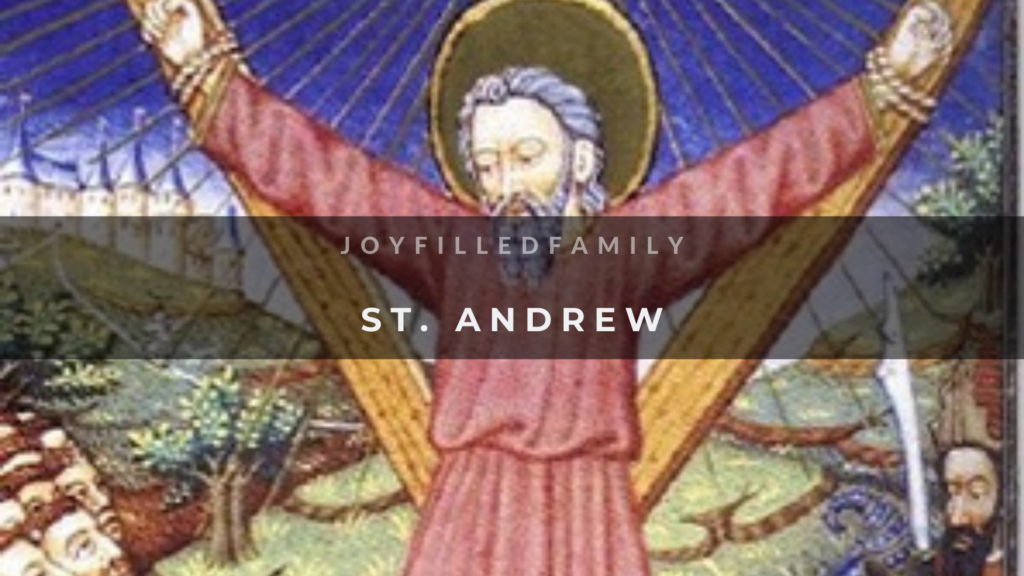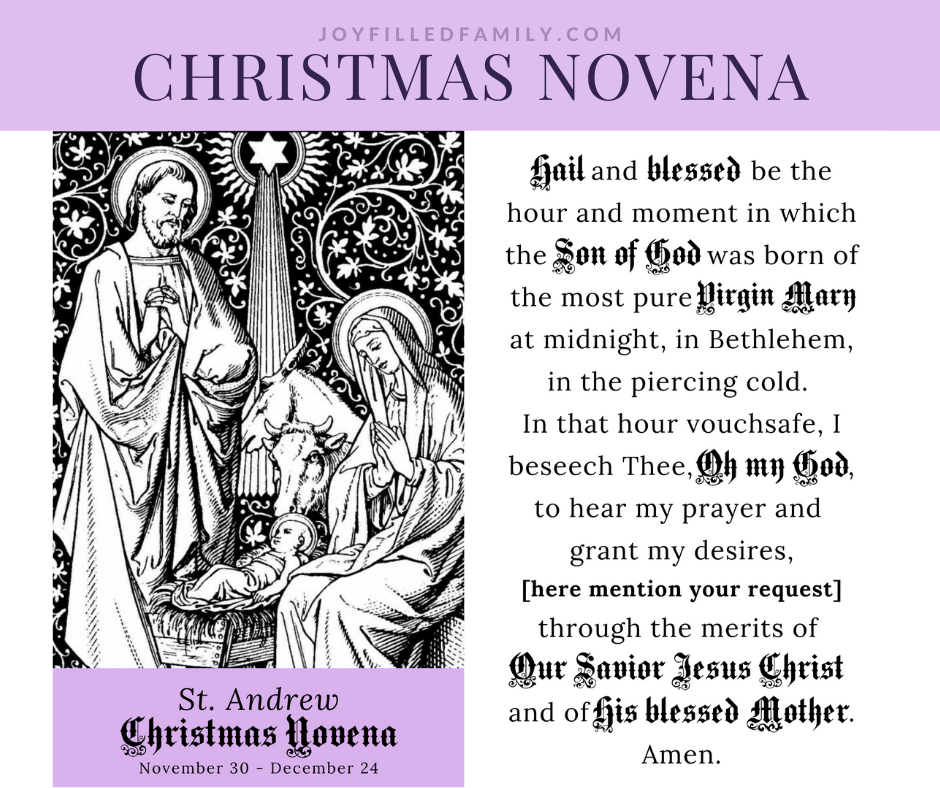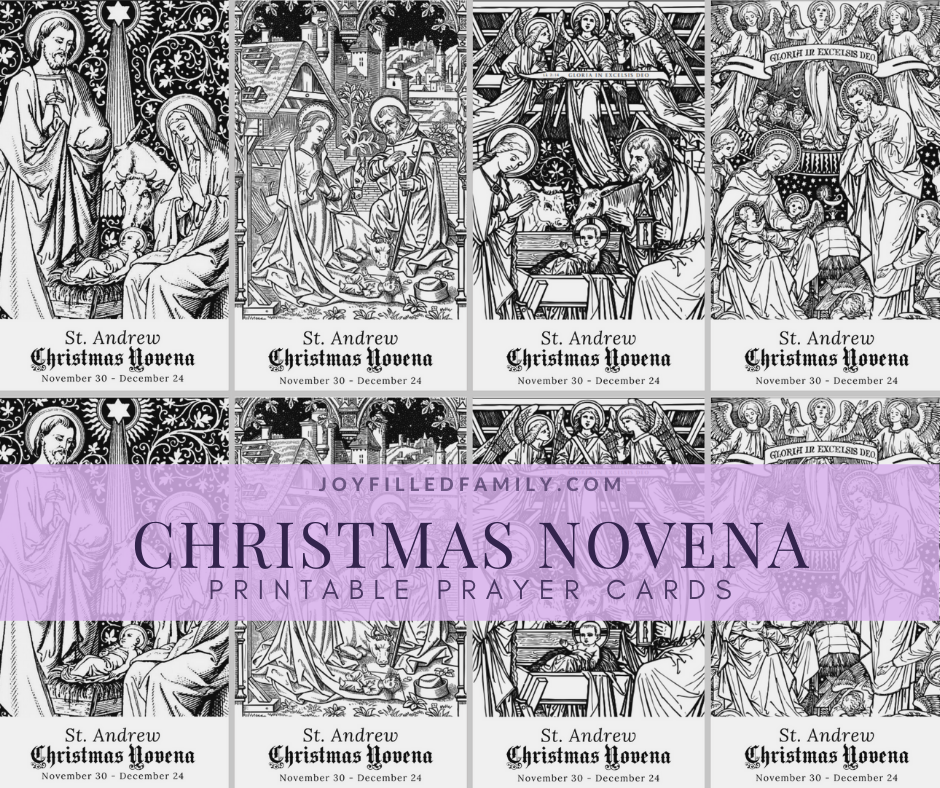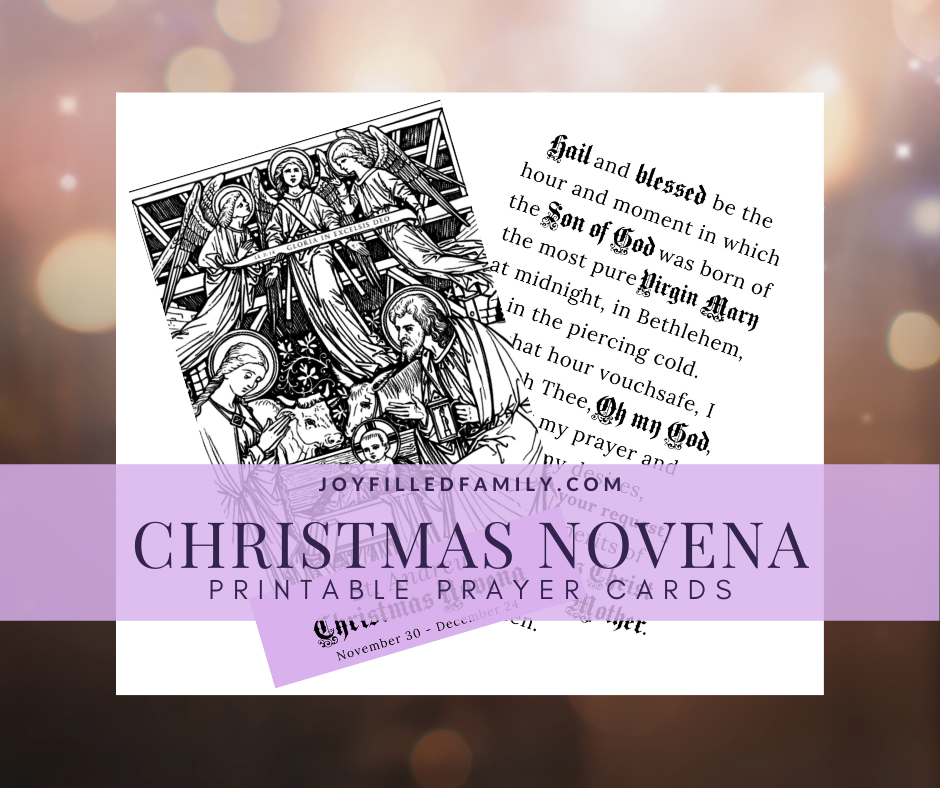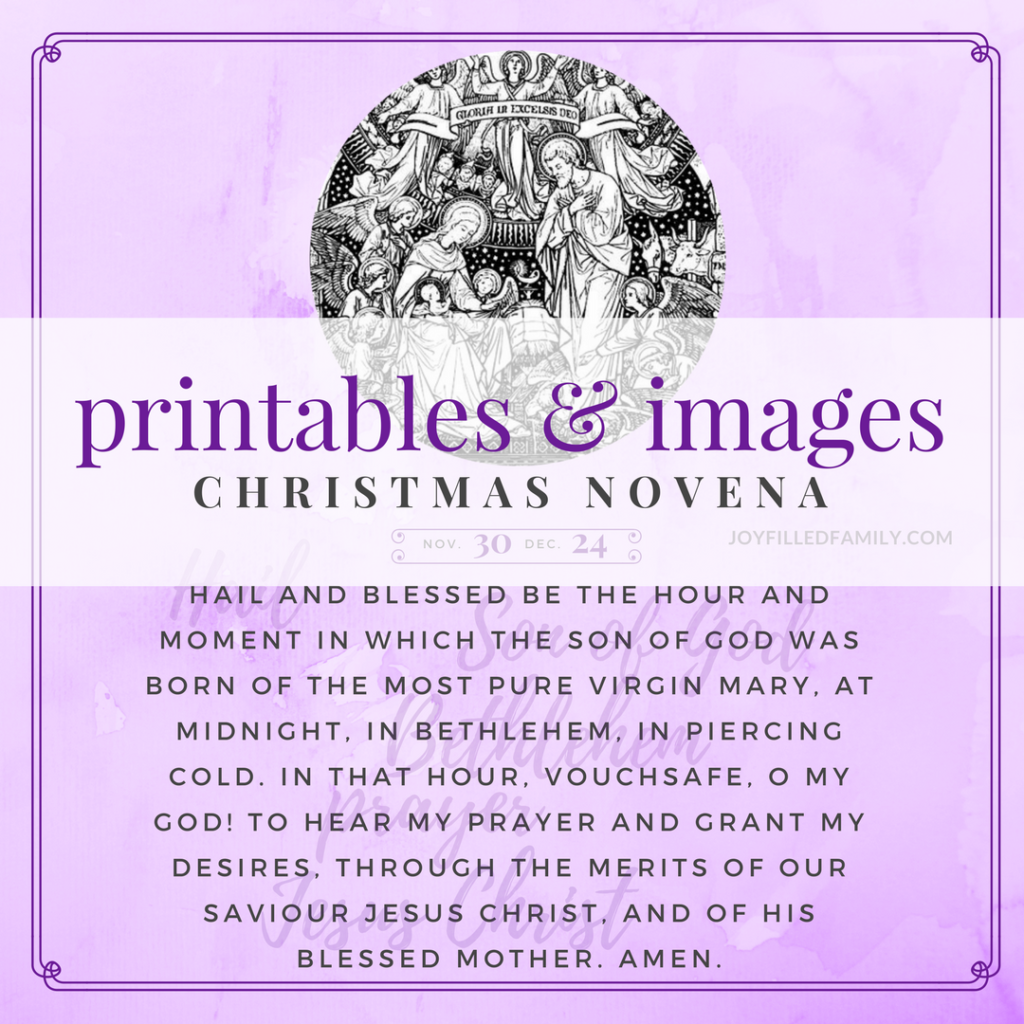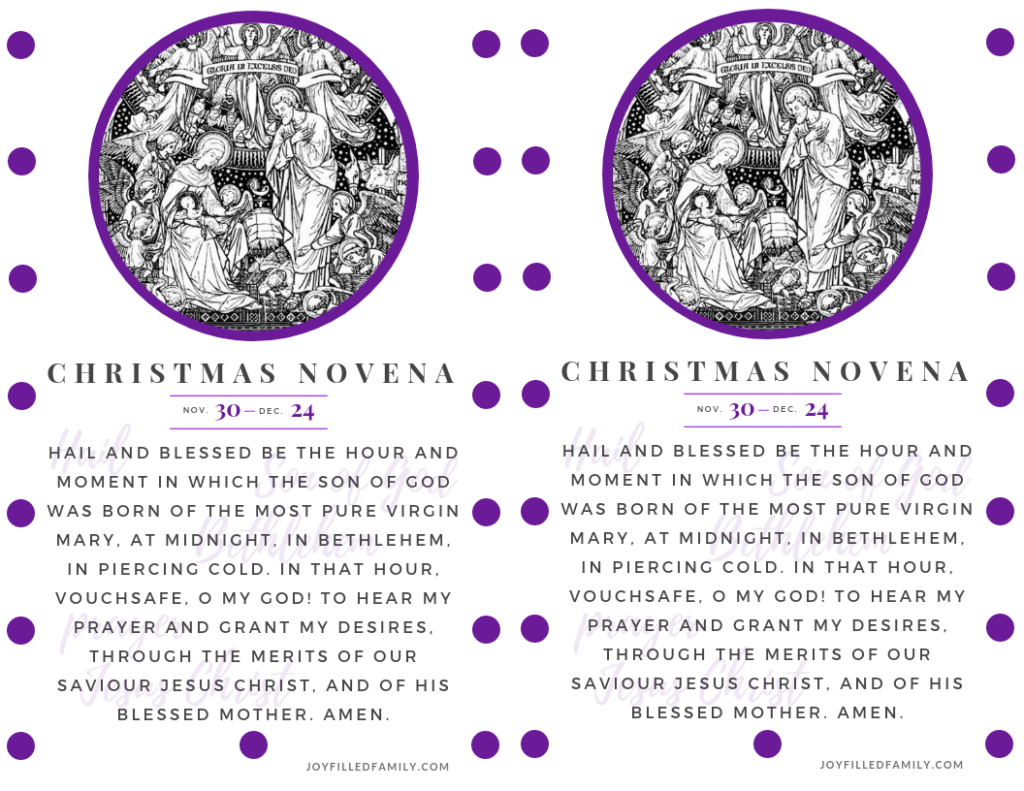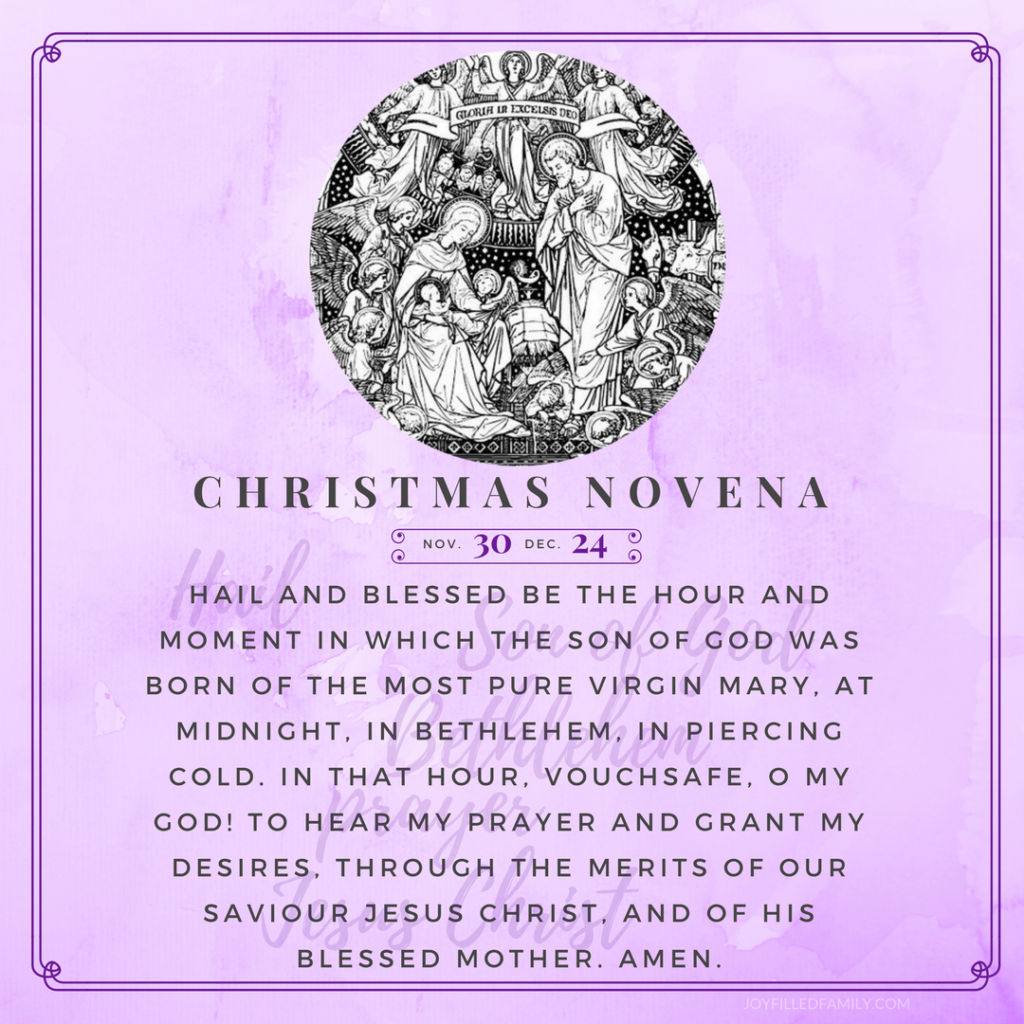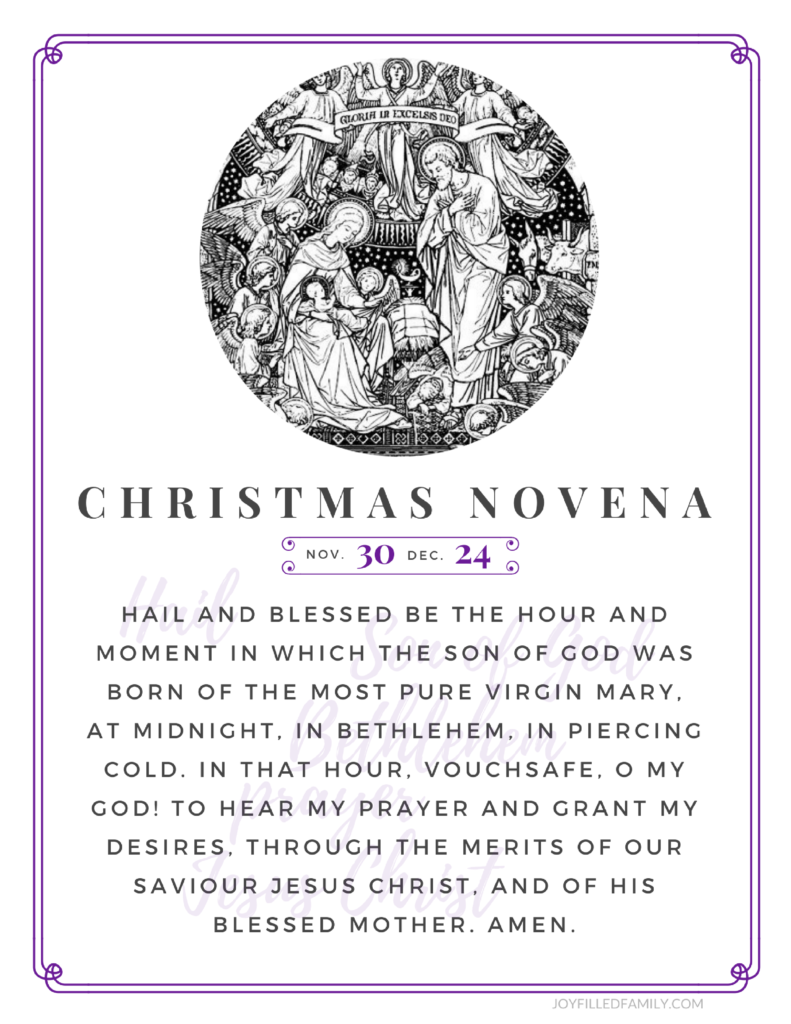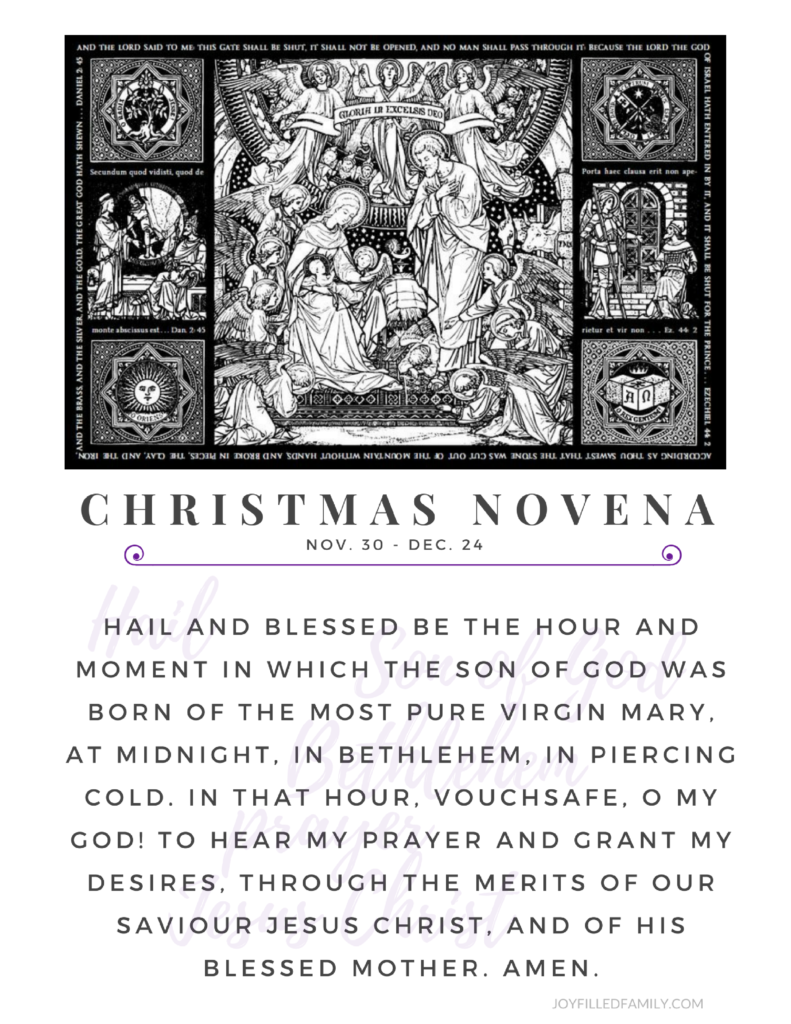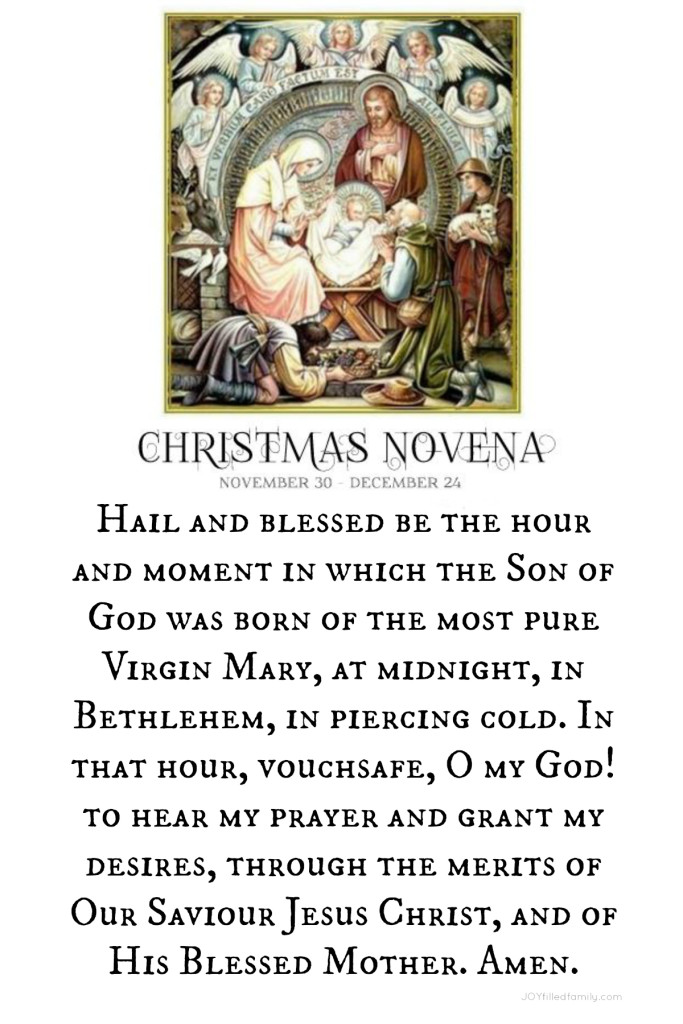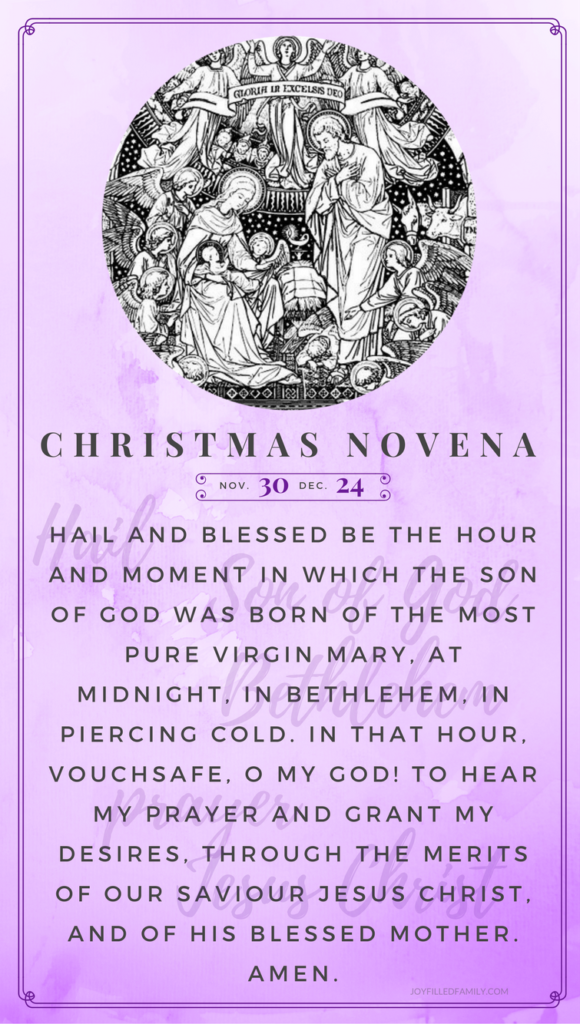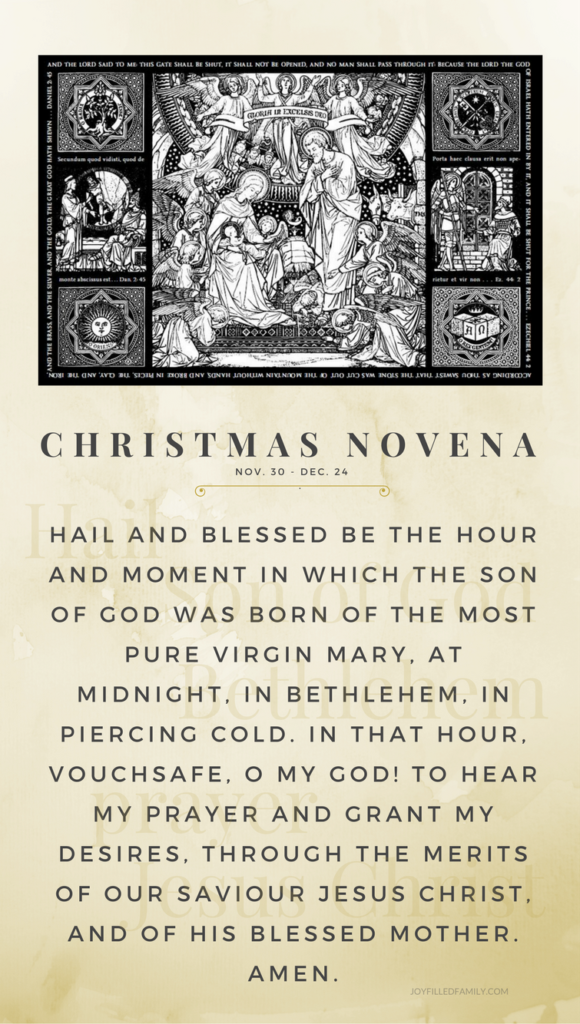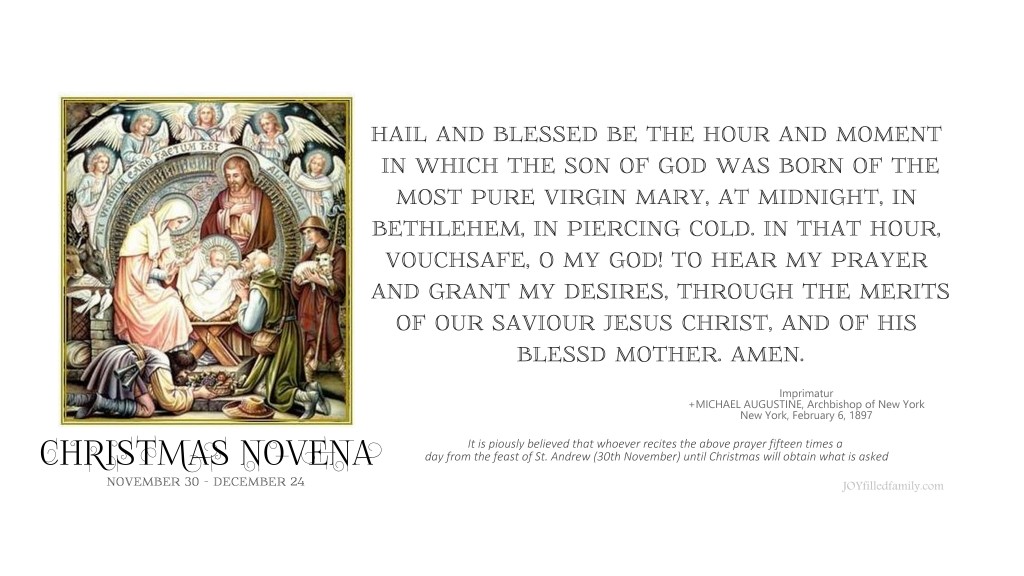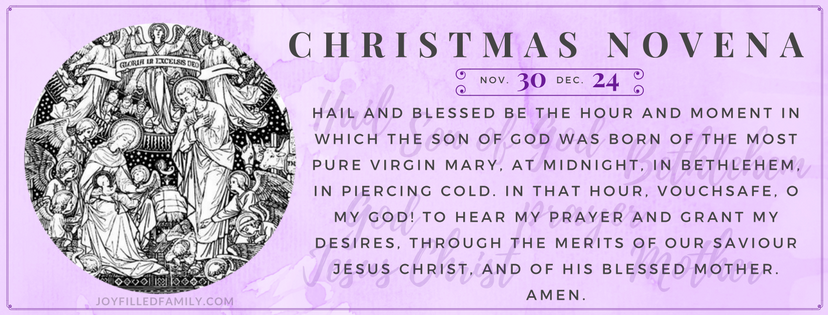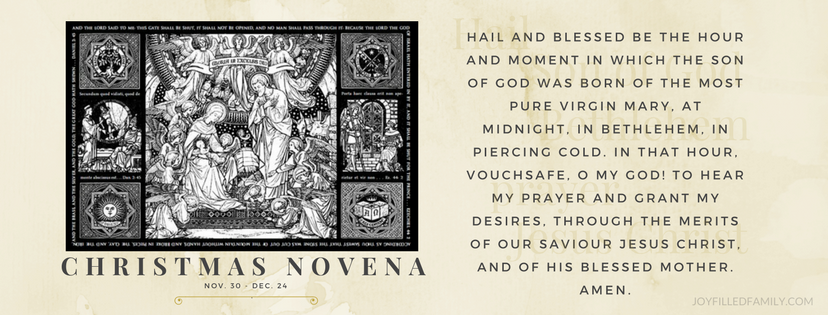After Andrew had stayed with Jesus and had learned much from him, he did not keep this treasure to himself, but hastened to share it with his brother Peter. Notice what Andrew said to him: “We have found the Messiah, that is to say, the Christ.” Notice how his words reveal what he has learned in so short a time. They show the power of the master who has convinced them of this truth. Andrew’s words reveal a soul waiting with the utmost longing for the coming of the Messiah, looking forward to his appearing from heaven, rejoicing when he does appear, and hastening to announce to great an event to others. To support one another in the things of the spirit is the true sign of good will between brothers, loving kinship and sincere affection. – from a homily on the Gospel of John by Saint John Chrysostom
Patronage:
- against cramps
- against convulsions
- against dysentery
- against fever
- against gout
- against neck pain, stiff neck or torticollis
- against paralysis
- against sore throats
- against whooping cough
- anglers
- boatmen
- butchers
- farm workers
- fish dealers
- fish mongers
- fishermen
- happy marriages
- maidens
- mariners
- miners
- old maids
- paralytics
- pregnant women
- rope makers
- sail makers
- sailors
- single lay women
- singers
- spinsters
- textile workers
- unmarried women
- water carriers
- women who wish to become mothers
Pictorial Lives of the Saints – Saint Andrew, Apostle
Saint Andrew was one of the fishermen of Bethsaida, and brother, perhaps elder brother, of Saint Peter, and became a disciple of Saint John Baptist. He seemed always eager to bring others into notice; when called himself by Christ on the banks of the Jordan, his first thought was to go in search of his brother, and he said, “We have found the Messias,” and he brought him to Jesus. It was he again who, when Christ wished to feed the five thousand in the desert, pointed out the little lad with the five loaves and fishes. Saint Andrew went forth upon his mission to plant the faith in Scythia and Greece, and at the end of years of toil to win a martyr’s crown. After suffering a cruel scourging at Patrae in Achaia, he was left, bound by cords, to die upon a cross. When Saint Andrew first caught sight of the gibbet on which he was to die, he greeted the precious wood with joy. “O, good cross!” he cried, “made beautiful by the limbs of Christ, so long desired, now so happily found! Receive me into thy arms, and present me to my Master, that He who redeemed me through thee may now accept me from thee.” Two whole days the martyr remained hanging on this cross alive, preaching, with outstretched arms from this chair of truth, to all who came near, and entreating them not to hinder his passion.
Reflection – If we would do good to others, we must, like Saint Andrew, keep close to the Cross.
Saints and Saintly Dominicans – 30 November
Saint Andrew, Apostle
Saint Andrew was the first of the Apostles to give himself to Christ, and it is said that having to frame one of the twelve articles of the “Creed,” he was responsible for this one, “And in Jesus Christ His only Son.” He freely reprimanded the Proconsul Aegeus for having opposed the preaching of the Gospel, and when in his anger he wished to force him to sacrifice to idols, Saint Andrew replied, in allusion to the Holy Sacrifice of the Mass: “Every day I immolate the immaculate Lamb, Who, after being distributed to the people, still remains living and entire.” He was heard to cry out at the moment of crucifixion: “O Cross, which has borne the members of my Saviour, with what splendor you shine in my eyes! By you my death shall resemble somewhat His own. I come to you, receive me; behold my title to this favor; I am the disciple of Him Whom we have adored within your arms.” The people, who loved him greatly, only waited for a sign from him to rush forward and deliver him from death. But he restrained, by a single look, the shudders of the faithful, and did not cease during two days to preach the Gospel from his cross. Maximilla, a high-born woman and most courageous, took away the body, embalmed and buried it. It was the 30th of November, 62 A.D., under Nero.
Prayer
Let worldlings be silent. Lord, and not say that Thou treatest Thy friends badly! It is in Thy goodness that Thou sendest them sufferings.
Practice
Receive each suffering or contradiction or humiliation with the same respect as if you were receiving a piece of the True Cross.
– taken from the book Saints and Saintly Dominicans, by Blessed Hyacinthe-Marie Cormier, O.P.
Fr. Weninger’s Lives of the Saints – Saint Andrew, Apostle
The holy Apostle, Saint Andrew, born at Bethsaida, in Galilee, was a brother of Saint Peter, and at first a disciple of Saint John the Baptist. He was the first of the Apostles who had the happiness of knowing Christ, the true Messiah; for, one day, when Andrew and another disciple were standing with their master on the banks of the Jordan, Saint John, pointing to Jesus, who was approaching, said: “Behold the Lamb of God!” No sooner had Andrew heard these words, than he and the other disciple followed Christ, and remained with Him that day. On the following day, meeting his brother, Simon, afterwards called Peter, he said to him: “We have found the Messiah,” and brought him to Christ. Not long after this, when Andrew and Peter were casting their nets into the Sea of Galilee, Christ called them, and said: “Come after Me, and I will make you to become fishers of men!” Immediately leaving their nets, they followed Him. From that moment, Andrew left the Lord no more, except at the time when He was seized in the Garden of Gethsemane, by the Jews, when he fled like the other disciples. He was present when Christ, after His resurrection, appeared to His disciples; when He ascended into heaven in their presence, and when He sent the Holy Ghost from heaven upon them. When the Apostles separated, and went into the different countries of the world, to preach the Gospel of Christ to all nations, Andrew travelled into Scythia, Thrace, Galatia and other Pagan countries, where he converted many thousands by his sermons, and by the miracles he performed. At last he came to Patrae, the capital of Achaia, in Greece, and there, too, preached, with apostolic freedom, the Word of the Lord, and approved it by many miracles, which induced a great number of the inhabitants to embrace Christianity. Aegeas, the governor, resisted him with all his might, and endeavored to defend idolatry. The holy Apostle, however, reproved him fearlessly, and said: “You desire that this people should recognize you as their judge; why, then, do you refuse to recognize Christ, the true God, as the Judge of all mankind; and why do you refuse to turn your heart from idolatry?” “Be silent!” replied Aegeas, “and speak not to me of your Christ. Was he not nailed by the Jews to a cross? How then can he be a true God? How can I worship him as God?” Andrew endeavored to explain the great mystery of the Redemption of the human race, and to show how Christ had, voluntarily, and for love of man, died the ignominious death of the cross; but Aegeas would not listen, and, interrupting him, commanded him immediately to sacrifice to the gods, or to prepare himself for a most cruel martyrdom. Andrew replied: “I offer daily, on the Altar, to the Almighty, who is the only true God, not the flesh of oxen, nor the blood of goats, but an unspotted Lamb, which, when the entire multitude of the faithful have partaken of its flesh, remains entire and living.” The governor, full of wrath, ordered Andrew to be cast into a dungeon; but the people, who loved the Saint as a father, rose against the governor, and ran in crowds to the dungeon, determined to set the prisoner free. But the Apostle besought them to be quiet, and not seek to prevent him from receiving the crown of martyrdom, which he had so long desired. The following day, Saint Andrew was brought before the governor, who offered him the greatest honors, if he would consent to sacrifice to the gods; but threatened him with the most cruel torments, if he persisted in refusing. The Saint said fearlessly: “The honors you offer me have no value in my eyes, because they are temporal and pass away; the tortures you threaten me with, I despise, for the same reason; but you, O Aegeas! have to fear torments which last for ever, if you do not abandon your idols, and recognize Jesus Christ for the true and only God, and worship Him as such.” After these words, the Saint continued to preach to the governor, and to all present, of the crucified Lord, and of the happiness of all those who suffer for Him. Aegeas, enraged at the Apostle’s fearlessness, ordered him to be most cruelly scourged, and then to be crucified, in order to make him resemble his God. This was meant by the governor in derision; but no manner of death could have been more welcome to Saint Andrew. The cruel and unjust sentence was received with murmurs by the people, of whom some were heard saying aloud: “This man is just, and a friend of God: why must he be crucified?” Andrew, addressing the people again, begged them not to deprive him of what he looked upon as an inestimable happiness. When he was led to the place of execution, and saw the cross on which he was to die, he cried out joyfully: “O precious cross, which I have so long desired, so truly loved, so ceaselessly sought; at last I find thee prepared to receive me. Take me away from the world, and unite me again with my Lord, that He who has redeemed me on thee, may again receive me by thee.” Thus cried the Saint from afar; but when he reached the cross, he embraced and kissed it, and gave himself willingly to the executioners, who bound him to it. No sooner had the cross been raised, than it served as a pulpit to the holy Apostle, and he exhorted the Christians to remain firm in their holy faith, and the heathens to convert themselves to the only true God. He explained the nothingness of the idols, and the truth of the Christian religion. For two days he lived and preached, hanging on the cross. The people began again to murmur against the governor, and desired to have the Saint taken down from the cross; but the holy martyr desired to be permitted to die upon it, as he esteemed death a priceless grace. On the third day, when the people seemed determined to rescue him by force, he called to his Saviour: “Do not permit, O Lord, that Thy servant, who, according to his own wish, hangs on the cross, be taken down from it; but do Thou take me from it to Thee, O my beloved Master, Jesus Christ, whom I have confessed and always loved, and whom, still confessing, I long to see. Take, O Lord Jesus, my spirit to Thee. I ardently desire to be united with Thee.” During this prayer, a bright light streamed from heaven, and rested upon the Saint, whilst he breathed his last. The martyrdom of Saint Andrew happened in the year of Our Lord 62, or, according to others, in 70.
His holy body was transported to Constantinople in the time of Constantine the Great; but was afterwards brought to Rome, where it has its resting-place in the Church of Saint Peter.
Practical Considerations
• Impress two memorable sayings of the holy Apostle deep into your heart. The first is: “I sacrifice daily to Almighty God, etc.” This is a glorious proof to you that the Apostles performed the holy Sacrifice of Mass; for to this alone can the words of Saint Andrew have reference. Conclude, therefore, from this, that it is false for the heretics to say that the first Christians knew nothing of Mass. Did not Saint Andrew live during the first years of Christianity? Be not confused by the lies of the heretics; but believe that Christ instituted the holy Sacrifice of the Mass at His Last Supper. The second memorable saying of the Apostle is: “The honors you offer me have no value in my eyes, because they are temporal and pass away; your tortures I despise for the same reason.” Consider it well. All temporal honors, all joys, pass away quickly. How foolish is it, therefore, to love them immoderately, and to forfeit for them the eternal honors, riches and joys! No pain or trial on this earth lasts for ever; but those which await the sinner in the other world, are endless. Should we not, therefore, do and suffer here so as to escape torments hereafter?
• Saint Andrew manifested great joy on beholding the cross that had been prepared for him; he greeted it warmly, and embraced it lovingly. He wished not to be released from it, but prayed to be allowed to die on it. You are not bound to a cross of wood like Saint Andrew, but the All-Wise sometimes lays a cross of suffering upon you, because He wishes to prepare you for heaven. How do you regard your cross? How do you carry it? I fear to ask you how you greeted, embraced and kissed it. Perhaps you have carried it, as Simon of Cyrene carried the Cross of the Lord, because you were forced, and could not help yourself. You have suffered only because you were obliged. You suffer murmuringly and complainingly, and perhaps even endeavor to free yourself from your cross by improper means. Oh! how differently did Saint Andrew act. He esteemed himself happy, because he could die on the cross like his Saviour, and because he had heard, from the lips of Christ, that the way of the Cross is the surest road to eternal life. You know all this; but you do not think seriously enough of it. In future, keep these truths before your eyes: first, the way of the Cross is the way to heaven; secondly, Christ died on the Cross for love of me. Whoever rightly considers these two points, will in his sufferings, not give way to resentment, murmurs or complaints, but will bear them if not cheerfully, at least patiently. Hence Saint Paul admonishes us, saying: “For, think diligently upon him that endured such opposition from sinners against himself, that you be not wearied, fainting in your minds.” (Hebrews 12)
Father Francis Xavier Weninger, DD, SJ. “Saint Andrew, Apostle”. Lives of the Saints, 1876.
Goffine’s Devout Instructions – Feast of Saint Andrew the Apostle

November 30
Andrew, a brother of Saint Peter, born at Bethsaida, was first a disciple of John the Baptist. Afterwards both the brothers were called by Christ, on the Sea of Galilee, before all the other apostles, with the words: “Come after Me, and I will make you to become fishers of men” (Mark 1:17). Immediately they left all, and became faithful disciples of Jesus, and witnesses of His deeds and sufferings, of His resurrection and ascension. After the descent of the Holy Ghost, Andrew travelled through Scythia, Epirus, and Thrace, and by his teachings and miracles converted vast numbers to Christ. As he was preaching at Patras, a city of Achaia, he was violently pressed by the proconsul Ægeas, to offer sacrifice to the idols; but he nobly answered him,
“I daily offer sacrifice to God; not the flesh of oxen, nor the blood of rams, but an unspotted Lamb; and although all the faithful may have partaken of His flesh, yet the Lamb remains as before He was offered, alive and undivided.”
Ægeas, enraged, committed him to prison, and on the following day caused him to be scourged; and he persevered in his declaration, condemned him to be put to death by crucifixion. When he saw the cross, the instrument of, his death, he greeted it with joy, embraced it, and said,
“O good cross, that was adorned with the limbs of Christ, thee have I long desired; thee have I fervently loved; thee have I continually sought. Now thou art made ready for me, according to the wish of my heart. Take me away from men, and restore me again to my Master, that through thee I may come to Him Who through thee has redeemed me.”
After this he was nailed to the cross. Two days he remained hanging thereon, preaching faith in Jesus, until his soul was taken up to Him Whom he had so ardently desired to resemble in the manner of His death.
In the Introit of the Mass the Church announces to us how greatly the apostles were exalted by God, Who made them teachers and fathers of the whole world. She cries out, therefore, “To me Thy friends, O God, are made exceedingly honorable; their principality is exceedingly strengthened. Lord, Thou hast proved me and known me; Thou hast known my sitting down and my rising up” (Psalm: 138). Glory be to the Father, and to the Son, and to the Holy Spirit. As it was in the beginning, is now, and ever shall be, world without end. Amen.
Prayer
We suppliantly beseech Thy majesty, O Lord, that as blessed Andrew the apostle was both a preacher and ruler of Thy Church, so he may be with Thee as a perpetual intercessor for us. Through Christ, etc. Amen.
Epistle: Romans 10:10-18
Brethren: With the heart, we believe unto justice; but, with the mouth, confession is made unto salvation. For the Scripture saith: Whosoever believeth in Him, shall not be confounded. For there is no distinction of the Jew and the Greek: for the same is Lord over all, rich unto all that call upon Him. For whosoever shall call upon the name of the Lord, shall be saved. How then shall they call on Him, in Whom they have not believed? Or how shall they believe Him, of Whom they have not heard? And how shall they hear, without a preacher? And how shall they preach unless they be sent, as it is written: How beautiful are the feet of them that preach the gospel of peace, of them that bring glad tidings of good things! But all do not obey the gospel. For Isaias saith: Lord, who hath believed our report? Faith then cometh by hearing; and hearing by the word of Christ. But I say: Have they not heard? Yes, verily, their sound hath gone forth into all the earth and their words unto the ends of the whole world.
Gospel: Matthew 4:18-22
At that time: Jesus walking by the Sea of Galilee, saw two brethren, Simon who is called Peter, and Andrew his brother, casting a net into the sea (for they were fishers). And He saith to them: Come ye after Me, and I will make you to be fishers of men. And they immediately leaving their nets, followed Him. And going on from thence, He saw other two brethren, James the son of Zebedee, and John his brother, in a ship with Zebedee their father, mending their nets: and He called them. And they forthwith left their nets and father, and followed Him.
Explanation
The alacrity with which Andrew followed the call of Jesus teaches us:
1. That we should, on the spot, give ear to God when He inspires us with a good thought, or calls us to a better course of life.
2. That, in order to follow His voice, we should cast behind us all desires for temporal goods, and even leave our parents, if they should prove a hindrance to us, for “he that loveth father or mother more than Me is not worthy of Me.” (Matthew 10:37)
Aspiration
Mayest Thou be forever praised, most amiable Jesus, that Thou didst choose, not the wise, the mighty, or the rich, but, what in the eyes of the world was foolishness, to confound the wisdom and power of the world, and didst accordingly graciously look upon poor fishermen, and exalt them to the height of the apostolic dignity. Look also with fatherly regards upon us, Thy frail children; call, nay, draw, us in such manner to Thee that, after the example of Saint Andrew, we may suffer nothing in the world to detain us from following Thee, and may always glory ill Thy cross, which is our salvation, our life, and our resurrection.
– Goffine’s Devout Instructions
The Liturgical Year: Saint Andrew, Apostle
30 November
We open our Proper of Saints for Advent with Saint Andrew, because, although his feast frequently occurs before this holy season has begun, it sometimes happens that we have entered Advent when the memory of this great Apostle has to be celebrated by the Church. This Feast is therefore destined to terminate, with solemnity, the Cycle which is at its close, or to add lustre to the new one which has just begun. It seems, indeed, fitting that the Christian Year should begin and end with the Cross, which has merited for us each of those years which it has pleased the divine goodness to grant us, and which is to appear, on the last day, in the clouds of heaven, as the seal put on Time.
We should remember that Saint Andrew is the Apostle of the Cross. To Peter, Jesus has given firmness of Faith; to John, warmth of Love; the mission of Andrew is to represent the Cross of his divine Master. Now it is by these three, Faith, Love, and the Cross, that the Church renders herself worthy of her Spouse. Everything she has or is, bears this threefold character. Hence it is that after the two Apostles just named, there is none who holds such a prominent place in the universal Liturgy as Saint Andrew.
But let us read the life of this glorious fisherman of the lake of Genesareth, who was afterwards to be the successor of Christ himself, and the companion of Peter, on the tree of the Cross. The Church has compiled it from the ancient Acts of the Martyrdom of the holy Apostle, drawn up by the Priests of the Church of Patrae, which was founded by the Saint. The Churches, too, both East and West, which have inserted these Acts in their respective Offices of Saint Andrew, are of some authority, as is also Saint Bernard, who has made them the groundwork of his three admirable Sermons on Saint Andrew.
About Saint Andrew
Andrew, the Apostle, born at Bethsaida, a town of Galilee, was brother of Peter, and disciple of John the Baptist. Having heard his master say, speaking of Christ: “Behold the Lamb of God!” he followed Jesus, and brought to him his brother also. When, afterwards, he was fishing with his brother in the sea of Galilee, they were both called, before any of the other Apostles, by our Lord, who, passing by, said to them: “Come after me; I will make you to be fishers of men.” Without delay, they left their nets and followed him. After the passion and resurrection, Andrew went to spread the faith of Christ in Scythia in Europe, which was the province assigned to him; then he travelled through Epirus and Thrace, and by his teaching and miracles converted inumerable souls to Christ. Afterwards, having reached Patrae in Achaia, he persuaded many in that city to embrace the truth of the Gospel. Finding that the Proconsul Ægeas resisted the preaching of the Gospel, he most freely upbraided him for that he, who desired to be considered as a judge of men, should be so far deceived by devils as not to acknowledge Christ to be God, the Judge of all.
Then Ægeas being angry, said: “Cease to boast of this Christ, whom such like words as these kept not from being crucified by the Jews.” But finding that Andrew continued boldly preaching that Christ had offered himself to be crucified for the salvation of mankind, he interrupts him by an impious speech, and at length exhorts him to look to his own interest and sacrifice to the gods. Andrew answered him: “I offer up every day to almighty God, who is one and true, not the flesh of oxen, nor the blood of goats, but the spotless Lamb upon the altar; of whose flesh the whole multitude of the faithful eat, and the Lamb that is sacrificed, remains whole and living.” Whereupon Ægeas being exceeding angry, ordered him to be thrust into prison, whence the people would easily have freed Andrew, had he not himself appeased the multitude, begging of them, with most earnest entreaty, that they would not keep him from the long-sought-for crown of martyrdom, to which he was hastening.
Not long after this, he was brought before the tribunal, where he began to extol the mystery of the Cross, and rebuke the judge for his impiety. Ægeas, no longer able to contain himself on hearing these words, ordered him to be hoisted on a cross, and so to die like Christ. Andrew, having been brought to the place of execution, seeing the Cross at some distance, began to cry out: “O good Cross, made beautiful by the body of my Lord! so long desired, so anxiously loved, so unceasingly sought after, and now at last ready for my soul to enjoy! take me from amidst men, and restore me to my Master, that by you He may receive me, who by you redeemed me.” He was therefore fastened to the cross, on which he hung alive two days, preaching without cessation the faith of Christ: after which he passed to Him, whose death he had so coveted. The Priests and Deacons of Achaia, who wrote his Passion, attest that all the things which they have recorded were heard and seen by them. His relics were first translated to Constantinople, under the emperor Constantius, and afterwards to Amain. During the Pontificate of Pius II, the head was taken to Rome, and placed in the Basilica of Saint Peter.
Let us now listen to the several Churches on earth, celebrating the grand triumph of our Apostle. Let us begin with Rome, the Mother and Mistress of all Churches. Nothing could be more expressive than the language she uses in praise of the Apostle of the Cross. First, she employs the words of the Gospel, which record the circumstances of his vocation; then, she selects the most touching passages from the Acts of his martyrdom, drawn up by the Priests of Patrse; and both are intermingled with appropriate sentiments of her own. Our first selection shall be from the Responsories of Matins.
R: When the Lord was walking by the sea of Galilee, he saw Peter and Andrew casting nets into the sea, and he called them, saying: Come after me, I will make you to be fishers of men.
V: For they were fishers, and he saith to them: Come after me, I will make you to be fishers of men.
R: As soon as blessed Andrew heard the voice of the Lord calling him, leaving his nets, by the use and working of which he lived, He followed him who gives the reward of eternal life.
V: This is he who, for the love of Christ, hung upon a cross, and for his law endured a passion. He followed Him who gives the reward of eternal life.
R: Andrew, the good Teacher, and the friend of God, is led to the cross; which, seeing afar off, he says: Hail, O Cross! Receive the disciple of Him who hung upon thee, Christ, my master.
V: Hail, O Cross, which art consecrated by the body of Christ, and art adorned by his members as with pearls. Receive the disciple of Him who hung upon thee, Christ, my master.
R: Andrew seeing the Cross, cried out, saying: O admirable Cross; O desirable Cross! Cross which shinest throughout the whole world! It Receive the disciple of Christ, and by you may He receive me, who dying by you redeemed me.
V: O good Cross, which art made fair and beautiful by the body of the Lord. Receive the disciple of Christ, and by you may He receive me, who dying by you redeemed me.
R: Saint Andrew prayed, as he looked up to heaven, and with a loud voice, cried out and said: You are my God, whom I have seen: suffer me not to be detached by the impious judge: For I have learnt the power of the holy Cross.
V: Thou art the Christ my master, whom I have loved, whom I have known, whom I have confessed: graciously hear me in this one prayer. For I have learnt the power of your holy Cross.
Antiphons
• Hail, O precious Cross! receive the disciple of Him, who hung upon thee, Christ my master.
• The blessed Andrew prayed, saying: O Lord, King of eternal glory, receive me hanging on this gibbet.
• Andrew, the servant of Christ, the worthy Apostle of God, the brother of Peter, and his companion in the cross.
• Maximilla, a woman dear to Christ, took the body of the Apostle, and embalming it, buried it in a most honoured place.
• You, O Lord, did plunge into hell them that persecuted your just one, and was his guide and helper on the wood of the cross.
Hymn
The following Hymn was composed, in honour of the holy Apostle, by Pope Saint Damasus, the friend of Saint Jerome. There is an allusion in it to the name Andrew, which, among its many meanings, has that of Beauty.
• The Beauty of your sacred name, expressive of your life, declares how Beautiful you are in the glory of your blessed cross.
• Andrew, Apostle of Christ, your very name points to the mystic Beauty of your soul.
• The Cross exalts you, the blessed Cross loves you, the bitter Cross prepares for you the joys of the light to come.
• The mystery of the Cross shines in you with a two-fold beauty: for by the Cross you vanquish insults, and you preach to men the Divine Blood shed on the Cross.
• Warm our languid hearts, and take us under your care so that, by the victory of the Cross, we may reach our heavenly country.
• Amen.
The two following Sequences, in honour of the Apostle of the Cross, were written in the Middle Ages. The first belongs to the eleventh century. Like all the Sequences of that period, it has no regular rhythm.
• The most holy praises of this day’s solemnity,
• Let the universal Church sing in worthy strains.
• The most holy merit of the meekest of saints is to be extolled,
• Of the Apostle Andrew, so bright in his admirable graces.
• Having learned from John the Baptist, that He had come, who would take sin away,
• He straightways entered his dwelling, and listened to his words;
• And finding his own brother, Barjona, he said to him with great joy: We have found the Messias.
• And he led him to the loved presence of the Saviour.
• As Andrew was fishing in the sea, the mercy of Christ called him,
• Giving him, in exchange for his art of fishing, the dignity of an Apostle.
• His soul, after the grand joys of the Paschal feast,
• Was visited by the glorious power of the Holy Ghost,
• That he might go and preach penance to the world, and tell it of the mercy of the Father by the Son.
• Rejoice, then, O Achaia! that you hast such an Apostle,
• Who enlightened you with his saving doctrine,
• And honoured you with his many and manifold miracles.
• But you fierce torturer, Ægeas, cry and weep:
• The pains of hell and eternal death are thine:
• Whilst Andrew has won happiness and joy by his Cross.
• O Andrew! now you seest your King: now you art in his presence;
• Now you art breathing the odour of sweetness, which comes from the aroma of divine love.
• Be, then, unto us a delicious sweetness, giving out the hidden balsam of the celestial life.
• Amen.
The second Sequence, written in rhythm and correct metre, is the composition of the pious Adam of Saint Victor, the greatest lyric poet of the Middle Ages.
• Let us exult and rejoice, and be delighted in the praises sung to Andrew the Apostle.
• His faith, and teachings, and actions, and all his labours for Christ, deserve a worthy celebration.
• ‘Twas he led Peter to the faith. ‘Twas he on whom the Light first shone; the Baptist showed it him.
• Near the sea of Galilee, our Lord called Peter and Andrew by the one same election.
• They who were once fishermen, are become heralds of the Word, and models of every virtue.
• They let down their nets for a draught of men; and carefully watch over the infant Church.
• Andrew is separated from his brother, and sent into the country about Achaia.
• A great portion of that province enters, by the grace of God, into Andrew’s net.
• The holy and learned Doctor forms the heart of his people by his faith, life, preaching, and miracles.
• When Ægeas discovered what Andrew had done, he was excited to great anger.
• But Andrew’s mind, ever calm and manly, set little value on this life, and armed itself with patience.
• The senseless judge offers him his favour, or threatens him with tortures, but cannot shake his constant soul.
• Seeing the Cross was being prepared, Andrew, as a true disciple, is proud to be thus made like his Master.
• He repays the death of Jesus by his own, ambitious to have the trophy of triumph, the Cross.
• He lived two days hanging on that Cross, which was to make him live for ever; the people resolve to loose him from it: but he would not have it so; and clings to his Cross.
• An exceeding bright light surrounds him for nearly half an hour; and then, in this light, and in this joy, he mounts to the realms of light,
• O glorious Andrew, whose prayers are so precious, and whose bright deathis so sweet to think on,
• Take us, by your loving prayers, from this vale of tears, and transfer us to that fair land of light, O you good Shepherd of souls.
• Amen.
The pieces so far given belong to the Roman Liturgy, being taken from the books of this Mother of Churches, or from those of the different Churches of the West, which follow the form of her Offices. We will now give, in honour of our holy Apostle, some of the formulae, which the other ancient Liturgies used for his feast; we will begin wdth the Ambrosian Rite, from which we take the following beautiful Preface.
It is truly meet and just, right and available to salvation, that we should always, and in all places, give thanks to thee, O holy Lord, Almighty Father, Eternal God; for we are keeping the feast of a sacred mystery, a day on which the blessed Andrew showed himself to be indeed the brother of Peter the Apostle, both by his preaching and his confession of your Christ; and filled up the measure of the apostolic dignity by his passion and his glory; for what he had loudly and boldly preached, he would not cease to proclaim even on his cross: and he deserved to follow, during life, the author of eternal life, and to imitate him in the manner of his death; that thus having, in obedience to his precept, crucified in himself all earthly desires, he might, in accordance with his example, be fastened to a cross. The two brothers, the two fishermen, are both, therefore, raised up to heaven by a cross; that so, having been, by your grace, bound together by so many ties during this life, they might also be like each other by the crown they wear in heaven; and as their combat was the same, their reward might be the same.
The Gallican Liturgy also celebrated the glories of Saint Andrew. Amongst the few fragments which have been handed down to us of this Liturgy, there is not a single piece in poetry. The following Preface, or, as it was then called, Contestation, will show that the Church of Gaul, from the fourth to the eighth centuries, shared the enthusiasm of the Roman and Ambrosian Churches for the glorious Apostle of the Cross.
Contestation
It is meet and just; it is right and just, that we. should give ineffable thanks to your mercy, O almighty and eternal God! and celebrate with incomparable joy the sufferings of your Saints, through Christ our Lord: Who gave to the blessed Andrew, at his first calling him, the gift of faith; and in his martyrdom, victory. Both had the blessed Andrew received; therefore had he constancy in his preaching, and patience in his passion. After being unjustly scourged, and thrust into prison, he was tied to a gibbet, and on it offered himself a pure sacrifice to you his God. Most gentle Saint, he lifts up his hands to heaven; he embraces the standard of the cross; he kisses it; he understands the secrets of the Lamb. When, at last, he was led to the cross, and fastened to it, his flesh suffered, but his spirit spoke. He forgot the torture of the Cross, whilst he preached Christ from the Cross; for the more his body was being stretched on the wood, the more did his tongue extol Christ, seeing that by thus hanging on the cross, he was honoured with being made a companion of Christ. He suffers not himself to be loosened from the cross, lest the combat should lose intensity by the delay. The crowd looks upon him, and is in lamentation; it knows him to be the physician of the soul, and demands that he be freed from his chains. It demands that the just man be liberated, lest this crime should destroy the people. Meanwhile, the Martyr breathes forth his soul, and goes to take possession of the kingdom of the eternal Judge. Grant us, O almighty God, by his merits, that we, being safe and protected from all evils, may for ever give praise and thanks to thee, our Lord, the God of the Martyrs, and the Prince of the Apostles.
The Mozarabic Liturgy is extremely rich in its praises of Saint Andrew, both in the Missal and the Breviary: we must limit ourselves to the following beautiful prayer.
Capitulum
O Christ, our Lord, who did beautify the most blessed Andrew with the grace of Apostleship and the crown of Martyrdom, by granting to him this special gift, that by preaching the mystery of the Cross, he should merit the death of the Cross: grant us to become most true loves of your holy Cross, and, denying ourselves, to take up our cross and follow you; that by thus sharing your sufferings in this life, we may deserve the happiness of obtaining life everlasting.
The Greek Church is as fervent as any of the Churches of the West in celebrating the prerogatives and merits of Saint Andrew. He is the more dear to it, because Constantinople considers him as her patron Apostle. It would, perhaps, be difficult for the Greeks to give any solid proofs of Saint Andrew’s having founded, as they pretend, the Church of Byzantium; but this is certain, that Constantinople enjoyed, for many centuries, the possession of the precious treasure of the Saint’s Relics. They were translated to that city in the year 357, through the interest of the Emperor Constantius, who placed them in the Basilica of the Apostles built by Constantine. Later on, that is, about the middle of the 6th century, Justinian caused them to be translated a second time, but only from one part of that same Basilica to another. We borrow the two following beautiful Hymns from the Menæa of the Greeks; the first is sung in the Evening Office, the second in the Morning Office.
When He, who is likened to the Star of early morn, whom we call the hypostatic splendour of the Father’s glory, willed in his great mercy to save the human race; you, O glorious Andrew, was the first to meet him, being enlightened interiorly with the most perfect brightness of his Divinity; hence you art called the herald and Apostle of Christ our Lord. Pray to him for us. that he save and enlighten our souls.
When He, whom the Precursors voice had proclaimed, the all-holy Word, was made Flesh, and gave us life, and gave the good tidings of salvation to the earth; then didst thou, most holy Andrew, follow him, and make thyself his first-fruits, and sacrifice, and as it were the first oblation of men: you didst make him known to your brother, telling him that this was our God. Pray to Jesus for us, that he save our souls.
When He appeared who clothed himself with our flesh in a virginal yet fruitful womb, and was thus the Son of a Virgin, the teacher of piety, giving us this model of purity; then wast you happy, O Andrew, most ardent lover of virtue; disposing in your heart to ascend step by step, and wast raised up from glory to the unspeakable glory of the Lord our God. Beseech him, that he save and enlighten our souls.
Leaving your fishing of fish, you catchest men by the rod of your preaching, throwing to them the bait of virtue, and dragging all nations from the depths of error, O Andrew, the Apostle, brother of the Leader, most honoured Prince of the earth,excelling and unfailing! may the venerable remembrance of you enlighten them that are in darkness.
Andrew, the Apostle, the first-called of your disciples, O Lord, and the imitator of your Passion, and made like to thee, drew out with the hook of your Cross them that lived and wandered in the sea of ignorance, and then brought them unto thee: therefore do we your faithful, who have been saved, cry to you by his prayers, O infinitely good Lord: grant us peaceful lives, and save our souls.
The Apostle, disciple of Christ, is a fire which inflames men’s minds and burns out their sins, penetrating into the very depth of their hearts: and by the mystic rays of his instructions he shines in the d arkhearts of the Gentiles. Then, too, he burns the wild brambles of pagan fables,for the fire of the Spirit has such energy! And is it not a wonder to be trembled at, that a tongue of slime, a nature of clay, a body of dust, should make known the intellectual and the immaterial Knowledge? Do thou, the initiated into unspeakable things, the contemplator of heavenly truths, pray that our minds be illumined.
Be glad, you heaven of eloquence, everywhere telling the glory of God! The first to obey our Lord with ardour, immediately uniting thyself to him, you wast set on fire by him, and didst appear as a second light, enlightening with your rays them that sat in darkness, thus imitating the mercy of Jesus for man. Therefore do we celebrate your most holy memory, and kiss with great joy the shrine of your Relics, from which flows health and every sort of boon to your clients.
By the nets of your oracles you didst draw from the abyss of ignorance the nations that knew not God, and gavest them life. Like the splendid courser of the Ruler of the Sea, thou, worthy of all praise, didst stir up the bitter waves by your wisdom. Thou, the venerable salt of earth, didst season with your penetrating wisdom what ungodliness was corrupting. This your wisdom, glorious Apostle, struck dumb with admiration those who had become imbued and puffed up with an unsound wisdom, and ignored the Lord that showed his great mercy to the world.
In the Morning Office
Not by thirst but by love wast you urged, O Andrew, when you didst run, as a stag, to the fountain of life. Leaning on faith, you didst give to drink of the fountains of incorruption to the distant nations that were parched with thirst.
Thou didst feel the law of nature, admirable Andrew, and you didst take your brother into partnership, crying out to him: We have found the Desired One! and thus he who was walking in the ways of the flesh, was brought by you to the knowledge of the Spirit.
When the Word said: Now, follow me, Cephas also joyfully followed Christ with Andrew, bidding farewell to father, boat, and nets, and became the citadels of the faith.
The deifying and exhaustless virtue of the mighty Creator of all things, and of the burning Spirit, dwelt in you in the form of a fiery tongue; showing that thou, O divine Andrew, wast a herald of unspeakable things.
Most honoured Andrew! he bore not weapons of the flesh for his defence, or for the destruction of the formidable ramparts of the enemy; but with a breastplate on him, he led subject to Christ the nations which had been redeemed by Christ from captivity.
Thy ineffable beauty, O Jesus, was first seen by Andrew, who then called out with a loud voice to his brother: Peter, he said, you man of ardent desires! we have found the Messias, whom the Law and the Prophets have foretold. O come, let us cling to this true life.
As your reward, O Apostle, Andrew, you hast regained him whom you desirest: him, with whom you didst bind up and worthily garner the sheaves of your labours. Therefore do we sing to you our hymns of praise.
Thou desiredst the Master, and you hast followed him, walking unto life in his footsteps, and imitating, even unto death, his passion, O verily venerable Andrew!
Calmly sailing the sea of the spiritual life, O Apostle, you didst cross it with the sails of the Spirit and the faith of Christ. Therefore didst you enter with joy into the port of life for ever.
The spiritual Sun having, by his own will, sunk on the cross, Andrew, that Sim’s reflection, the great and bright light of the Church, wishing also to be dissolved and to set with Him, was hung upon a cross.
As the best of all the disciples of Him, who, of his own will, was fastened to the cross, thou, O blessed Apostle, following your Master even unto death, you didst ascend with joy to the summit of the Cross, showing us the way that leads to heaven.
Rejoice now, O Bethsaida! for in you and your maternal fount bloomed the two most fragrant lilies, Peter and Andrew, bearing, by the grace of Christ, whom they resembled in his passion, the odour of the preaching of the faith to the whole world.
The city of the Fathers possesses you as its pastor, its divine chief, its liberator in all dangers and its keeper, O Andrew, full of wisdom! Gratefully has it kept your feast. Unceasingly pray for it that it may be preserved from all danger.
The Church of Constantinople, so devoted, as we have seen, to the glory of Saint Andrew, was at length deprived of the precious treasure of his Relics. This happened in the year 1210, when the City was taken by the Crusaders. Cardinal Peter of Capua, the Legate of the Holy See, translated the body of Saint Andrew into the Cathedral of Amalfi, a town in the Kingdom of Naples, where it remains to this day, the glorious instrument of numberless miracles, and the object of the devout veneration of the people. It is well known how, at the same period, the most precious Relics of the Greek Church came, by a visible judgment of God, into the possession of the Latins. Byzantium refused to accept those terrible warnings, and continued obstinate in her schism. She was still in possession of the Head of the holy Apostle, owing, no doubt, to this circumstance, that in the several Translations which had been made, it had been kept in a separate reliquary by itself. When the Byzantine Empire was destroyed by the Turks, Divine Providence so arranged events, as that the Church of Rome should be enriched with this magnificent Relic. In 1462, the Head of Saint Andrew was, therefore, brought thither by the celebrated Cardinal Bessarion; and on the twelfth of April of that same year, Palm Sunday, the heroic Pope Pius II went in great pomp to meet it as far as the Bridge Milvius (Ponte Molle), and then placed it in the Basilica of Saint Peter, on the Vatican, where it is at present, near the Confession of the Prince of the Apostles. At the sight of this venerable Head, Pius II was transported with a religious enthusiasm, and before taking up the glorious Relic in order to carry it into Rome, he pronounced the magnificent address which we now give, as a conclusion to the liturgical praises given by the several Churches to Saint Andrew.
“At length, you hast arrived, O most holy and venerable Head of the saintly Apostle! The fury of the Turks has driven you from your resting-place, and you art come as an exile to your Brother, the Prince of the Apostles. No, your Brother will not fail thee; and by the will of God, the day shall come when men shall say in your praise: happy banishment, which caused you to receive such a welcome! Meanwhile, here shalt you dwell with your Brother, and share in his honours.
“This is Rome, the venerable City, which was dedicated by your Brother’s precious blood. The people you seest, are they whom the blessed Apostle, your most loving Brother, and Saint Paul, the Vessel of Election, regenerated unto Christ our Lord. Thus the Romans are your kinsmen. They venerate, and honour, and love you as their Father’s Brother; nay, as their second Father; and are confident of your patronage in the presence of the great God.
“O most blessed Apostle Andrew! you preacher of the truth, and defender of the dogma of the most Holy Trinity! with what joy dost you not fill us on this day, whereon it is given us to behold your sacred and venerable Head, which deserved that, on the day of Pentecost, the Holy Paraclete should rest upon it in the form of fire!
“O ye Christians that visit Jerusalem out of reference for your Saviour, that there ye may see the places where his feet have stood; lo! here is the throne of the Holy Ghost. Here sat the Spirit of the Lord. Here was seen the Third Person of the Trinity. Here were the eyes that so often saw Jesus in the flesh. This was the mouth that so often spake to Jesus; and on these cheeks did that same Lord doubtless impress his sacred kisses.
“O wondrous Sanctuary, wherein dwelt charity, and kindness, and gentleness, and spiritual consolation. Who could look upon such venerable and precious Relics of the Apostle of Christ, and not be moved? and not be filled with tender devotion? and not shed tears for very joy? Yea, O most admirable Apostle Andrew! we rejoice, and are glad, and exult, at this your coming, for we doubt not but what you tlryself art present here, and bearest us company as we enter with your Head into the Holy City.
“The Turks are indeed our enemies, as being the enemies of the Christian Religion; but in that they have been the occasion of your coming amongst us, we are grateful to them. For, what greater blessing could have befallen us, than that we should be permitted to see your most sacred Head, and that our Rome should be filled with its fragrance? Oh! that we could welcome you with the honours which are due to thee, and receive you in a way becoming your exceeding holiness! But, accept our good will, and our sincere desire to honour thee, and suffer us now to touch your Relics with our un- worthy hands, and, though sinners, to accompany you into the walls of the City.
“Enter, then, the Holy City, and show your love to her people. May your coming be a boon to Christendom. May your entrance be peaceful, and your abode amongst us bring happiness and prosperity. Be you our advocate in heaven, and, together with blessed Apostles Peter and Paul, defend this City, and protect, with your love, all Christian people; that, by your intercession, the mercy of God may be upon us, and if his indignation be enkindled against us by reason of our manifold sins, let it fall upon the impious Turks and the pagan nations that blaspheme our Lord Jesus Christ.
“Amen.”
Thus has the glory of Saint Andrew been blended, in Rome, with that of Saint Peter. But the Apostle of the Cross, whose feast was heretofore kept, in many Churches, with an Octave, has also been chosen as Patron of one of the Kingdoms of the West. Scotland, when she was a Catholic country, had put herself under his protection. May he still exercise his protection over her, and, by his prayers, hasten her return to the true faith!
Let us now, in union with the Church, pray to this holy Apostle, for this is the glorious day of his feast: let us pay him that honour which is due to him, and ask him for the help of which we stand in need.
We have scarce begun our mystic journey of Advent, seeking our divine Saviour Jesus, when lo! God grants us to meet thee, O blessed Andrew, at our very first step. When Jesus, our Messias, began his public life, you hadst already become the obedient disciple of his Precursor, who preached his Coming: you wast among the first of them who received the Son of Mary as the Messias foretold in the Law and the Prophets. But you couldst not keep the heavenly secret from him who was so dear to thee; to Peter, then, you didst bear the Good Tidings, and didst lead him to Jesus.
O blessed Apostle! we also are louging for the Messias, the Saviour of our souls; since you hast found him, lead us also unto him. We place under thy protection this holy period of expectation and preparation, which is to bring us to the day of our Saviour’s Nativity, that divine Mystery in which he will manifest himself to the world. Assist us to render ourselves worthy of seeing him on that great night. The baptism of Penance prepared you for receiving the grace of knowing the Word of life; pray for us that we may become truly penitent and may purify our hearts, during this holy time, and thus be able to behold Him, who has said: Blessed are the clean of heart, for they shall see God.
Thou hast a special power of leading souls to Jesus, O glorious Saint! for even he, who was to be made the Pastor of the whole flock, was presented to the Messias by thee. By calling you to himself on this day, our Lord has given you as the Patron of Christians who, each year, at this season, are seeking that God in whom you art now living: they must begin it with praying to you to show them the way which leads to Jesus.
Thou teachest us this way; it is that of fidelity, of fidelity even to the Cross. In that way you didst courageously walk: and because the Cross leads to Jesus Christ, you didst passionately love the Cross. Pray for us, O holy Apostle! that we may begin to understand this love of the Cross; and that having understood it, we may put it in practice. Thy brother says to us in his Epistle: Christ having suffered in the flesh, be you also armed with the same thought.1 Thy feast, O blessed Andrew! shows us you as the living commentary of this doctrine. Because thy Master was crucified, you would st also be crucified. From the high throne to which you hast been raised by the Cross, pray for us, that the Cross may be unto us the expiation of the sins which are upon us, the quenching of the passions which burn within us, and the means of uniting us by love to Him, who, through love alone for us, was nailed to the Cross.
Important, indeed, and precious are these lessons of the Cross; but the Cross, O blessed Apostle, is the perfection and the consummation, and not the first commencement. It is the Infant God, it is the God of the Crib that we must first know and love; it was the Lamb of God that Saint John pointed out to thee; and it is that Lamb whom we so ardently desire to contemplate. The austere and awful time of Jesus’ Passion is not come; we are now in Advent. Fortify us for the day of combat; but the grace we now most need, is compunction and tender love. We put under your patronage this great work of our preparation for the Coming of Jesus into our hearts.
Remember also, O blessed Andrew, the holy Church, of which you wast a pillar, and which you hast beautified by the shedding of your blood: lift up your hands for her to Him, whose battle she is for ever fighting. Pray that the Cross she has to bear in this her pilgrimage, may be lightened; that she may love this Cross, and that it may be the source of her power and her glory. Remember with especial love the holy Roman Church, the Mother and Mistress of all Churches; and by reason of that fervent love she has for thee, obtain for her victory and peace by the Cross. Visit anew, in your Apostolic zeal, the Church of Constantinople, which has forfeited true light and unity, because she would not render homage to Peter, your brother, whom you honouredst as your Chief, out of love to Him who is the common Master of both him and thee. And lastly, pray for Scotland, that has dishonoured thy protection for these three past ages; obtain for her that the days of her rebellion from the faith may be shortened, and, with the rest of our Isle of Saints, soon return to the fold of the One Shepherd.
Hymn for the Time of Advent
We will close this day with a prayer to the Saviour, whom we are expecting; and celebrate, by this ancient and venerable Hymn, the mystery of his Coming.
• Rejoice, ye Flowers of the Martyrs! Hail, all ye people and nations! lift up your eyes to heaven, and await the sign of glory.
• The voice of the Prophets is heard, announcing the coming of Jesus; it is the harbinger of our Redemption, of the grace which saved us.
• How bright is our morn, and how do our hearts swell with joy, when the faithful voice comes heralding in our glory!
• May the joy of so great a salvation, whereby the world is redeemed, inspire us with a solemn canticle in praise of Jesus’ coming.
• It was his first: and he came not to punish, but to heal the sores and sins of the world, saving his creature that was lost.
• But when the second Advent comes, it will tell the world that Christ is at its very doors, to give the Saints their crowns, and throw open the kingdom of heaven.
• We have a promise of eternal light; the star of our salvation is rising; and even now its splendid rays are calling us to our right to heaven.
• Thee alone, O Jesus, do we seek, and wish to see you as you art, God. Happy vision, which will put us out of all reach of hell.
• That thus, when you comest, O Redeemer, surrounded by the white-robed army of Martyrs, thoumayest admit us also into their pure company.
• To God the Father, and to his Only Son, and to the Holy Paraclete, be glory both now and for ever.
• Amen.
– from the Mozarabic Breviary
– The Liturgical Year: Advent, by the Very Reverend Dom Prosper Gueranger, Abbot of Solesmes, translated from the French by the Revered Dom Laurence Shepherd, Monk of the English-Benedictine Congregation, 2nd edition; published in Dublin Ireland by James Duffy, 15 Wellington-Quay, 1870





